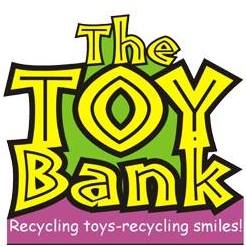Cause Area
Primary Sectors
Secondary Sectors
Financials
-
2022
Total IncomeRs.2,211,958Total ExpensesRs.2,211,957Non Program ExpensesRs.376,032Program ExpensesRs.1,835,925Tip: Click on any value above to exclude it. -
2024
Total IncomeRs.3,568,219Total ExpensesRs.4,361,156Non Program ExpensesRs.396,468Program ExpensesRs.3,964,688Tip: Click on any value above to exclude it.
Geographies Served
Programs
-
-
-
-
-
Safe playroom Program
District
South Delhi
States
Delhi
The Toy Bank establishes Safe Playrooms in Municipal Schools of Delhi for economically weaker section children. These playrooms are equipped with child-friendly infrastructure, including furniture, toys, board games, and other educational materials. With over 100 varieties of age-appropriate toys and games, the playrooms enable children to engage in free play and recreational activities. The focus is on providing learning through play, as it supports the development of social, cognitive, physical, language, numeracy, environmental awareness, life skills, and emotional well-being.
-
Reach and Teach Program
District
South Delhi
States
Delhi
To mitigate the adverse effects of the Covid-19 pandemic lockdown on underprivileged children in India, The Toy Bank has launched the "Reach and Teach Programme" in Municipal schools of Delhi. The programme aims to provide activity-based learning kits and toys to increase access to learning aids at home. Additionally, daily e-learning activity worksheets, virtual guiding videos, and audios explaining concepts and activities are shared with students from first to fifth grade. The e-learning classes are designed to be flexible and accessible to students with phones or other electronic devices. The programme focuses on strengthening existing knowledge, promoting emotional stability during the lockdown, reducing dropout rates, and providing equal opportunities for recreational activities.
-
Anganwadi Toy Connect Program
States
Delhi
Rajasthan
The first six years of a child's life have been recognised as the most critical ones for optimal development. Since the process of human development is essentially cumulative in nature, investment in programmes for the youngest children in the range of 0-6 years has begun to be accepted as the very foundation for basic education and lifelong learning and development. Over the years, the field of childcare, inspired by research and front-line experiences, has developed into a coherent vision for Early Childhood Care And Education. The Toy Libraries aims to increase the access of toys, storybooks, board games, rattle toys, educational toys and much more. Different variety of toys will involve the children in physical and mental exercise. It concentrates on providing holistic childhood development through toys and board games. Since during these years, a child develops social, cognitive, physical and emotional skills that form the foundation needed to have a healthy future. The Toy Bank also aims to strengthen the capacities of the Anganwadis staff by creating "20 Activity Modules" which will be used by the Anganwadi centres. These Activity Modules are carefully mapped and provide specific guidance to Anganwadi staff in selecting the appropriate toy or play material to deliver learning through PLAY. These multi-purpose modules will incorporate basic numeracy, language, environment and others into the children's structured play sessions to enhance the holistic development of a child through toys. By working on all the domains such as sensory, fine and gross motor skills, social, emotional, language, teamwork and much more to have social and emotional well being.
Impact Metrics
-
Total Number of Children Impacted
Year-wise Metrics- 2017-18 16924
- 2018-19 518598
- 2019-20 529201
- 2020-21 530132
- 2021-22 521682
-
Total Number of Toy Libraries Created
Year-wise Metrics- 2017-18 533
- 2018-19 5160
- 2019-20 5355
- 2020-21 5382
- 2021-22 5404
-
Equal Opportunities to Play
Year-wise Metrics -
Learning Level of the Students- Language, Numeracy, Environmental Awareness and Life Skills
Year-wise Metrics -
Increase in Attendance
Year-wise Metrics -
Availability of Toy/Play Materials and Educational Aids
Year-wise Metrics -
Improvement in the Skills of the Children
Year-wise Metrics
Registration Details
-
PAN Card
AACTT0720C
-
Registration Number
No. 813 in Book 4 Vol. 3,007 on pages 11 to 19 dated 28/02/2012
-
CSR Form 1
CSR00005512
-
80G
AACTT0720CF20214
-
12A
AACTT0720CE20214
-
FCRA
231661847
About
-
Headquarters
New Delhi, Delhi
-
Since
2011
Impact
The Toybank Charitable Trust has positively impacted the lives of 5,29,201 children, distributing 15,42,444 toys, and saving 386,500.3 pounds of CO2 emissions across 26 states and 4 union territories.
Vision and Mission
Mission - The Toy Bank envisages a society where the underprivileged children have the Right to Play and get their childhood back by actively involving them in educative toys and story books in order to help them gain an active and enriching life
Vision- To enable every underprivileged child an opportunity to have holistic development through toys, games and story books
To bridge the gap between the privileged and underprivileged children by instilling values of sharing and caring in each child
Political & Religious Declarations
-
Political Affiliation
-
Religious Affiliation
Location
-
Offices in Cities
Other Details
-
Type
Non-profit
-
Sub Type
Trust
Website
Technology Adoption
-
SOC 2 Compliant
No
-
Financial Management
-
Beneficiary Management



